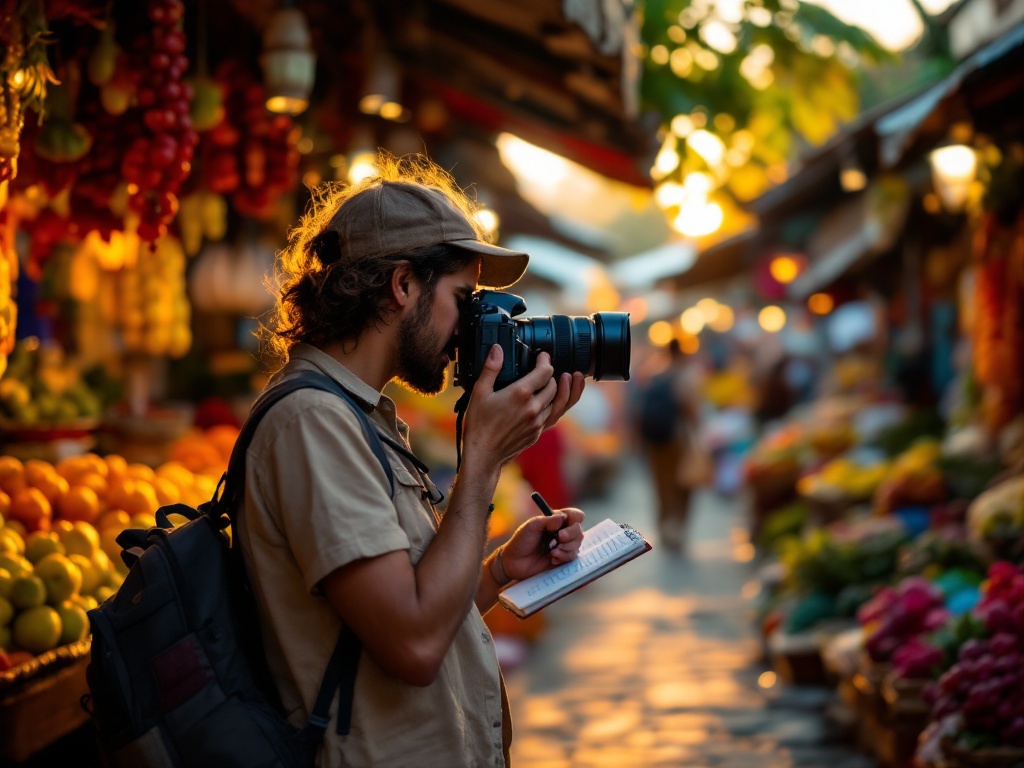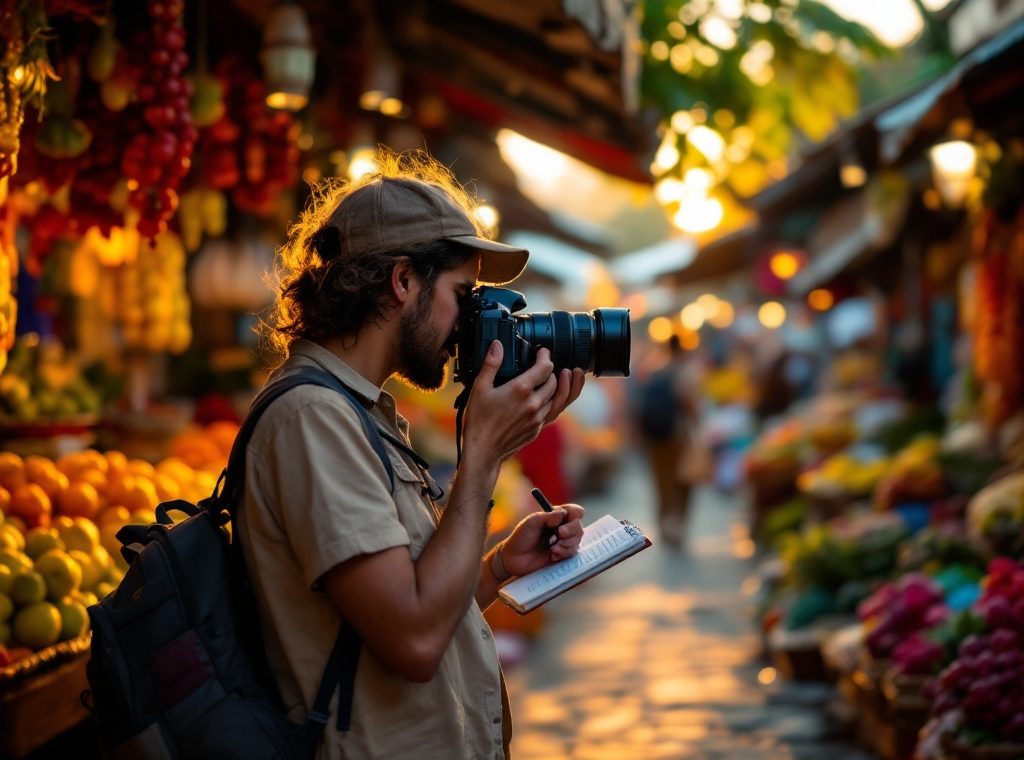How to Become a Travel Journalist without a Degree?
Dream of becoming a travel journalist but don’t have a degree? Discover how you can turn your passion for travel into a fulfilling career. This comprehensive guide reveals how to hone essential writing, photography, and videography skills, build a captivating portfolio, and network strategically. Learn the secrets to pitching stories successfully, leveraging social media, and finding mentorship opportunities. Start your exciting journey as a travel journalist today!
Important information

- A formal degree is not required to become a travel journalist; practical experience and a strong portfolio are more important.
- Building a network of industry contacts (editors, writers, etc.) is crucial for finding opportunities and mentorship.
- Aspiring travel journalists should focus on developing core skills such as compelling storytelling, photography/videography, research, cultural sensitivity, and adaptability.
- Creating an online presence through blogging, vlogging, podcasting, and social media is key for building an audience and promoting work.
- Continuous learning through online courses and workshops can improve essential skills and keep journalists up-to-date with industry best practices.
Understanding Travel Journalism Without a Degree
Aspiring travel journalists don’t necessarily need a degree. The power of travel journalism lies in its ability to transport readers to exciting new destinations through captivating narratives, showcasing unique cultural experiences, and fostering a deeper understanding of the world. Sharing diverse stories from around the globe encourages broader perspectives.
What Does a Travel Journalist Do?
Travel journalists craft compelling narratives, venturing into fascinating destinations and connecting with the local communities. They chronicle their journeys, offering fresh perspectives and broadening our global understanding through vibrant storytelling. These narratives ignite our wanderlust, inspiring us to explore the world.
Why a Degree Isn’t Necessary for a Travel Journalism Career
While a formal degree isn’t required to become a travel journalist, real-world experience is essential. Sharpen your writing and storytelling abilities, and cultivate strong communication skills. A varied portfolio showcasing your work is key to getting noticed. Networking is crucial for industry access, so build relationships and actively promote your writing. Here’s a breakdown of how to get started:
Hone Your Craft: Focus on developing strong writing and storytelling skills. Practice crafting compelling narratives that capture the essence of your travel experiences.
Build a Portfolio: Start creating a diverse portfolio of your travel writing. This could include blog posts, articles, or even social media content showcasing your abilities.
Network Strategically: Connect with other travel writers, editors, and industry professionals. Attend industry events, conferences, or join online communities to expand your network.
Promote Your Work: Actively share your writing on various platforms. Use social media, your website, or online writing communities to get your work seen by a wider audience.
Building Core Skills for Travel Journalism
Compelling narratives are key to drawing readers in.
Photojournalism and videography add depth and visual interest, keeping audiences engaged.
Thorough research ensures accuracy, building credibility with readers.
Adaptability is crucial, as these journalists often encounter unfamiliar situations, demanding flexibility and resourcefulness.
Cultural sensitivity is vital for respectful reporting, leading to insightful stories that reflect a genuine understanding of diverse cultures.
Essential Writing and Storytelling Skills
Master the art of descriptive writing, painting vivid pictures with your words to transport readers.
Develop a compelling narrative voice that draws your audience into your adventures.
Conduct thorough research to ensure accuracy and add depth to your stories, enriching them with insightful details.
Structure your work with a clear beginning, middle, and end to provide a framework for your narrative.
Practice consistently to hone your skills and develop a unique writing style that sets your work apart.
Developing Photojournalism and Video Production Skills
Photojournalism and video production are invaluable tools for travel journalists, breathing life into their stories. A strong foundation in photography is essential. Mastering composition, lighting, and editing helps capture truly stunning images that captivate readers. Videography adds another dimension, allowing viewers to experience the journey through skillfully shot and edited footage. Visuals like these deeply engage audiences, conveying the heart of a travel experience far more effectively than words alone. However, developing these skills requires dedication and practice. Online courses and workshops provide excellent training, but consistent practice is key to honing your visual storytelling abilities. Capture the world and share its beauty through compelling imagery.
Photography
A strong foundation in photography is essential for travel journalists. Mastering composition, lighting, and editing helps capture stunning images that captivate readers.
Videography
Videography adds another dimension to travel journalism. It allows viewers to experience the journey through skillfully shot and edited footage, engaging audiences more deeply.
Developing these skills requires dedication and practice. Online courses and workshops provide excellent training. Consistent practice is key to honing your visual storytelling abilities.
Gaining Practical Experience in Travel Journalism
Gain practical experience as an aspiring travel journalist through various avenues. Internships at travel magazines or websites provide invaluable, hands-on training. Volunteering to write for non-profits or travel organizations is another way to practice and build a strong portfolio. This portfolio should showcase diverse writing samples, such as destination features, travel tips, and cultural insights. Freelancing for magazines, newspapers, and online publications builds experience and credibility. Starting a travel blog is a smart move. It allows you to hone your skills, document your adventures, and control your content. While building a blog audience takes time and effort, the experience gained is invaluable. Be patient, your persistence will pay off.
Secure internships at travel magazines or websites to gain hands-on training and practical experience.
Volunteer to write for non-profits or travel organizations to practice writing and build a strong portfolio.
Create a diverse portfolio showcasing destination features, travel tips, and cultural insights.
Freelance for magazines, newspapers, and online publications to build experience and credibility.
Start a travel blog to hone skills, document adventures, and control content.
Finding Entry Points: Internships and Volunteer Opportunities
Internships at travel magazines or online publications offer invaluable experience and networking opportunities.
Volunteering for smaller publications, blogs, or non-profits builds a strong portfolio and enhances a resume.
Both avenues cultivate essential skills and foster vital industry connections for a successful travel journalism career.
Building a Strong Portfolio and Body of Work
A strong portfolio showcases your diverse skills and experience with various samples, like writing, photography, and videos. Organize it well to boost your job prospects. Consider including the following:
- Published articles,
- blog posts,
- photography projects, and
- video documentaries to further enhance its impact.
Freelancing: Submissions to Magazines, Newspapers, and Online Outlets
Freelance travel journalists create compelling articles, captivating photos, and engaging videos for various media outlets, such as magazines, newspapers, and online platforms. A strong portfolio is essential for successfully pitching unique travel stories. Aspiring travel journalists should explore diverse avenues like travel blogs, online magazines, and social media to showcase their work. Freelance submissions are crucial for media outlets to meet the high demand for new travel content and diverse perspectives.
Establishing an Online Presence
Document your adventures through various media formats, including blogs, vlogs, and podcasts, to build a loyal following. Networking with editors and fellow journalists is essential for career growth. Leverage social media platforms like Instagram, Twitter, and Facebook to connect with potential clients and share your work. This not only promotes your personal brand but also positions you as a recognized travel journalist.
Blogging, Vlogging, and Podcasting as a Travel Journalist
Travel journalists are increasingly using blogs, vlogs, and podcasts to broaden their reach. These platforms not only strengthen their brand but also diversify their content delivery.
Blog
A blog effectively showcases written articles, photos, and other travel-related materials.
Vlog
Vlogs add a dynamic visual element with engaging videos.
Podcast
Podcasts offer immersive audio experiences through storytelling and interviews.
This multi-platform strategy establishes them as travel authorities and significantly broadens their audience. For example, a journalist might blog about an Italian adventure, then complement it with a vlog showcasing Italy’s sights and sounds, and finally, share interviews with local chefs on their podcast.
Leveraging Social Media for Networking and Promotion
Networking with travel industry professionals on social media offers invaluable opportunities. Connect with relevant communities on platforms like Twitter, Instagram, and LinkedIn to expand your audience and showcase your expertise. This can lead to exciting job offers and collaborations. For example, travel journalists can use Instagram to share captivating photos and stories, while LinkedIn serves as a powerful platform for connecting with potential clients and employers. Participating in online discussions and sharing industry insights can establish you as a thought leader, opening doors to further networking and career advancement.
Networking and Building Relationships
Networking is essential for travel writers. Connecting with editors, fellow writers, and other professionals can lead to mentorships, collaborations, and job opportunities. Industry events like TBEX and WITS offer excellent networking opportunities.Mentorship is invaluable for aspiring travel journalists. Experienced professionals can provide guidance, support, and industry insights, including advice and feedback. Networking, both at events and online, helps in finding mentors. The International Food, Wine & Travel Writers Association (IFWTWA) also offers helpful mentorship programs.
Attending Workshops, Conferences, and Industry Events
Networking is crucial for travel journalists. Attending workshops, conferences, and industry events provides invaluable opportunities to connect with editors, writers, and other professionals, potentially leading to mentorships, collaborations, and job opportunities. These events also offer insights into the latest industry trends and best practices. TBEX (Travel Blog Exchange) and WTM (World Travel Market) are excellent resources for learning and networking. Building strong relationships is essential for a thriving career in travel journalism.
Finding Mentorship Opportunities
Connect with experienced travel journalists through industry events, online groups, and social media. Building these relationships can lead to valuable mentorship, providing guidance, feedback, industry insights, and even open doors to new opportunities. Organizations like the Society of American Travel Writers (SATW) offer excellent networking and mentorship programs. Participating in travel writing communities, such as online forums and workshops, also provides valuable learning experiences. Remember that genuine connections take time, so focus on fostering authentic relationships. Here’s how you can connect with travel journalists and build meaningful relationships:
Attend Industry Events. Conferences, workshops, and festivals are great places to meet travel journalists and editors. Prepare beforehand by researching attendees and identifying individuals you’d like to connect with.
Join Online Communities. Engage with travel journalists in online groups, forums, and social media platforms. Share your work, participate in discussions, and offer support to fellow writers.
Seek Mentorship Programs. Look for mentorship programs offered by organizations like SATW. These programs provide structured guidance and support from established travel journalists.
Build Authentic Relationships. Focus on creating genuine connections by engaging in thoughtful conversations and offering support. Remember that building strong relationships takes time and effort.
Pitching Stories and Creating Opportunities
Crafting a winning story pitch requires effort. A strong pitch immediately captures the reader’s interest, beginning with a compelling headline and a concise story summary. Explain why the story matters to them and highlight your unique perspective, showcasing your writing style through a captivating narrative. Researching the target publication and tailoring your pitch demonstrates professionalism and an understanding of their audience. Including data strengthens your pitch and showcases your expertise. Following up afterwards demonstrates initiative.
Career Paths in Travel Writing
Freelancing offers flexibility, allowing you to choose your projects and work at your own pace. A full-time position provides stability, benefits, and a regular income.
- Create content for tourism boards, showcasing destinations and attractions.
- Consider copywriting for travel agencies, crafting compelling advertisements and brochures.
- Explore editorial roles in travel magazines or websites, curating and editing travel content.
Finding Opportunities
Networking with industry professionals and attending conferences can open doors to job opportunities and collaborations. Explore online job boards and media/journalism platforms, which frequently list travel writing positions. A robust online portfolio showcasing your best work is essential for attracting clients and employers. Actively promoting your work through social media and other channels can also help you gain visibility and land new opportunities.
How to Pitch Stories to Media Outlets Successfully
Tailor your pitch to the specific media outlet and its audience. Research the publication’s style, focus, and target demographic to ensure your pitch resonates with them.
Craft a concise and captivating message with a headline that immediately grabs their attention. Your headline should be clear, concise, and create a sense of urgency or intrigue.
Briefly outline your story, emphasizing its relevance to their readership. Clearly explain the core of your story and why it matters to their specific audience.
Highlight what sets your story apart. Explain the unique angle or perspective you bring to the topic, showcasing its originality and newsworthiness.
Incorporate personal anecdotes to add a human touch. Personal stories create an emotional connection with the reader, making your pitch more memorable and relatable.
Adhere to their submission guidelines. Carefully follow the publication’s specific instructions for submitting pitches, demonstrating professionalism and respect for their process.
Follow up politely. A polite follow-up email a week or two after your initial pitch can remind the editor of your story and show your continued interest.
Cultivate relationships with editors. Building strong relationships with editors is essential for long-term success in media relations.
Exploring Travel Writing Jobs and Opportunities
Freelance travel journalists can earn a comfortable living, but finding work requires a strategic approach. Several avenues can lead to exciting projects: tourism boards, travel agencies, and various media outlets. Explore online job boards and freelance platforms specializing in travel writing. Networking is also crucial. Connect with other writers and attend industry events to uncover hidden opportunities. Finally, a strong online presence, such as a blog or portfolio website, is essential for showcasing your skills and attracting clients.
Continuous Learning and Professional Development
Enhance your travel journalism with online courses and resources. Continuous learning is crucial for ethical reporting, keeping you abreast of industry developments and media ethics. Hone essential skills like writing, photography, and storytelling to thrive in this field. Expand your knowledge with courses on cultural sensitivity, vital for understanding diverse perspectives. Boost your online presence with SEO training to attract a wider audience. Invest in your professional growth and become a more accomplished travel journalist. Here’s how you can benefit from continuous learning:
Stay Ethical and Informed
Media ethics and industry best practices are constantly evolving. Courses can provide guidance on responsible reporting, ensuring your work remains credible and impactful.
Hone Essential Skills
Elevate your writing, photography, and storytelling abilities. Strong skills are fundamental to captivating your audience and conveying compelling travel narratives.
Embrace Cultural Sensitivity
Deepen your understanding of diverse cultures and perspectives. Cultural sensitivity is paramount for respectful and insightful travel journalism.
Boost Your Online Presence
Expand your reach and impact with SEO training. Learn how to optimize your content for search engines, attracting a wider audience to your work.
Utilizing Online Courses and Resources for Skill Enhancement
Enhance your skill set in crucial areas like writing, photography, video editing, and social media management through online courses. Platforms such as Coursera, edX, and Skillshare provide extensive specialized training, boosting your storytelling, multimedia production, and online presence. They also delve into essential topics like SEO and content marketing. For those seeking expert guidance, MasterClass offers invaluable insights from established travel journalists, who share their secrets to a thriving career.












